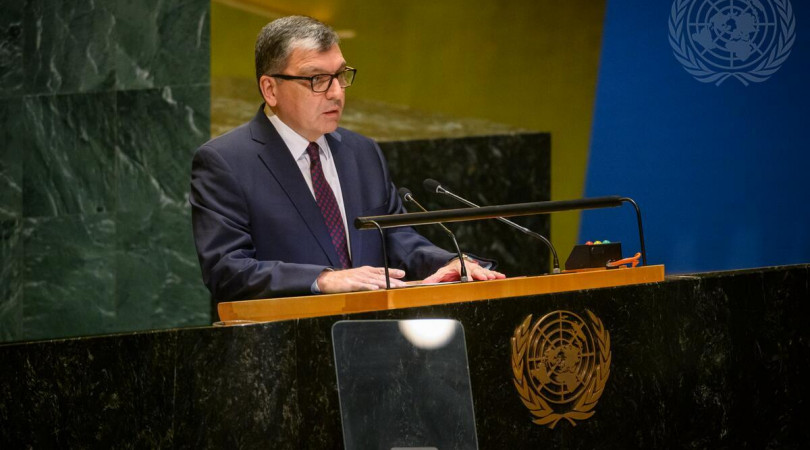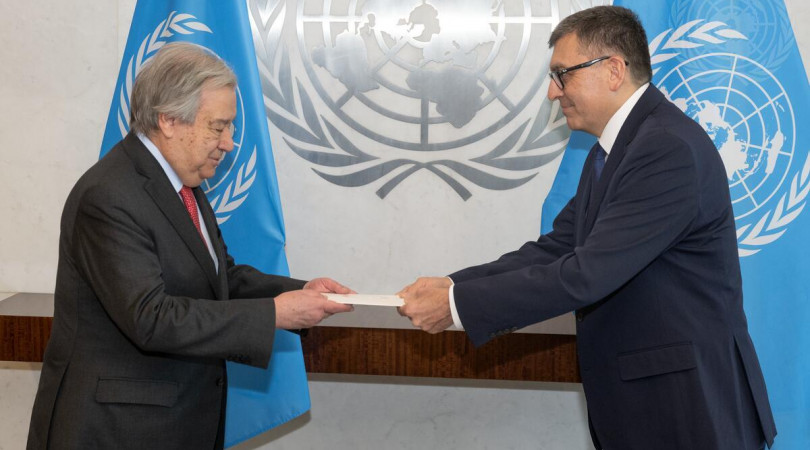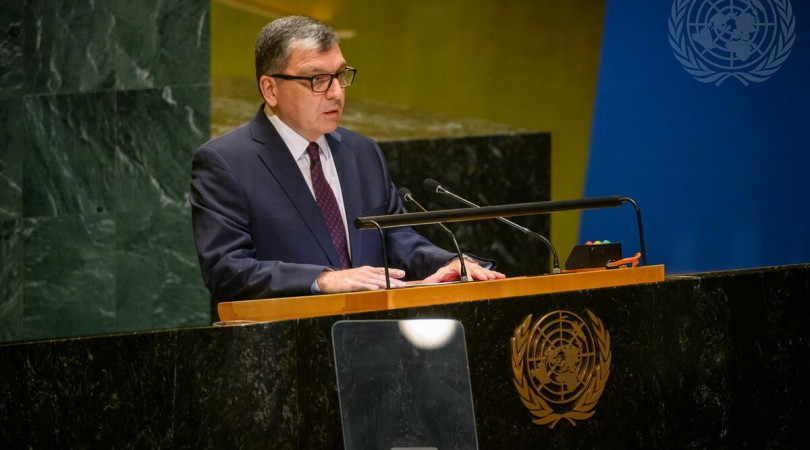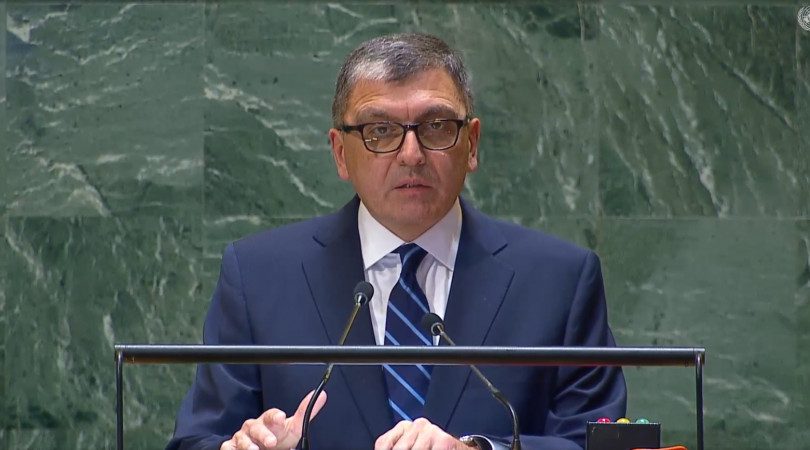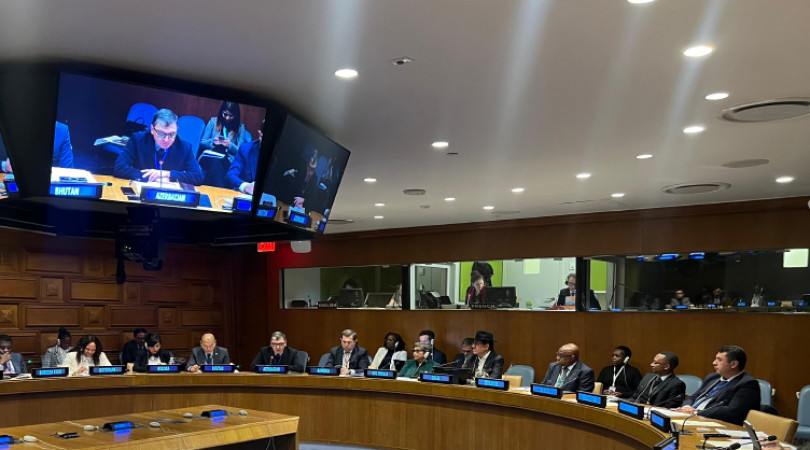High Representative for the United Nations Alliance of Civilizations at the Opening Ceremony 7th Global forum of UNAOC in Baku on April 26
Opening remarks by Nassir Abdulaziz Al-Nasser,
The High Representative
for the United Nations Alliance of Civilizations
Your Excellency, President Ilham Aliyev, the President of the Republic of Azerbaijan,
Your Excellency, President Recep Tayep Erdogan, The President of Turkey
Your Excellency, Jose Manuel Garcia Margallo, Minister of Foreign Affairs of Spain
Distinguished guests, Delegates
Ladies and Gentlemen,
Let me begin by expressing my deep appreciation and gratitude to His Excellency, Mr. Ilham Aliyev the President of the Republic of Azerbaijan, and the Government of Azerbaijan for hosting the 7TH Global Forum of the United Nations Alliance of Civilizations on the theme “Living together in inclusive societies: a challenge and a goal ”. President Aliyev’s leadership on this issue is especially noteworthy. His initiative proclaiming 2016 as a Year of Multiculturalism is widely acclaimed as an important step that aims at strengthening relations among the peoples of the world. In that respect, we could not dream of a better venue than the city of Baku to hold this Forum.
In the past few years I have had the privilege to promote multiculturalism and tolerance. The Alliance is the soft power tool established to contribute to a more peaceful world by countering radicalization and polarization, by encouraging greater intercultural understanding and engaging in projects and programs that advance these goals.
And today we all have the opportunity to explore the gains we have made , the challenges that we face and the possibilities that lie before us.`
Our theme this year, “Living together in inclusive societies: a challenge and a goal” converges with the four pillars of the United Nations: peace and security, human rights, rule of law, and development. More directly, it converges with the 2030 Agenda for Sustainable Development. Specifically, Sustainable Development Goal 16 calls upon us to “Promote peaceful and inclusive societies for sustainable development, provide access to justice for all and build effective, accountable and inclusive institutions at all levels”.
Sustainable development cannot be realized without peace and security; at the same time, peace and security will be at risk without sustainable development.
Inclusive societies provide avenues for political, social and economic inclusion. They guarantee social and human rights, access to opportunities and employment. By doing these things they reduce the risks of violent extremism and terrorism.
Rising disparities of wealth and opportunities within societies lead to marginalization and exclusion. Gender inequality, unemployment, and particularly youth unemployment, fuel radicalization and push people towards violent extremism.
Many years of experience have proven that heavy-handed approaches and a single-minded focus only on security measures have failed. We know that extremism and terrorism flourish when human rights are violated and aspirations for inclusion ignored. We must pay particular attention to addressing the causes of violent extremism.
Too many people, especially young people, join terrorist groups because they lack prospects and meaning in their lives. We need to make a special effort to reach out to young people and recognize their potential as partners and leaders. We need to support their dreams of a better life and a positive vision of the future. Their voices need to be heard in political processes and decision-making. Their participation is an important element in building inclusive societies that can resist the threat of violent extremism.
Building inclusive societies requires overcoming challenges in the areas of dialogue and integration, education, youth, cultural diversity, migration, media and communication. These areas are all part of the Alliance of Civilizations’ mandate.
Understanding, preventing, and thwarting violent extremism is one of the most challenging issues facing humankind. Violent extremism is an affront to the purposes and principles of the United Nations.
The Secretary-General called upon the different UN departments and entities to work together, to implement his Plan of Action to prevent violent extremism, through an inclusive approach, “Delivering as one”.
The United Nations Alliance of Civilizations works on inclusive approaches to address all these global challenges in the context of cultural and religious diversity, including violent extremism. We participated among other UN agencies and divisions in drawing the Secretary General’s Plan of Action to Prevent Violent Extremism. Our project activity is designed to counter polarization, radicalism, and violent extremism, in particular when they are religiously or culturally motivated. Various sessions in the forum’s program addresses the issue of violent extremism in the context of media, youth, religion and education.
Last year, UNAOC celebrated its tenth anniversary and Member States acknowledged the importance of the support through the passage by consensus of a new General Assembly resolution. Its project activity is indeed having a positive impact on the issues that contribute to the prevention of violent extremism. Over time, these projects have changed the lives of those who participated in them.
The impact of UNAOC project activity cannot be measured solely by the number of people exposed to training, capacity building, intercultural exchange and educational programming. The real benefit is measured by the numbers of people affected by the activities of those young civil society leaders and their programs at the community, regional and national level when they go back home. By that measure, UNAOC programming has had a positive impact on hundreds of thousands of people, many young people, who have been provided positive messages of tolerance, understanding and mutual respect.
Ladies and gentlemen,
We need to counter narratives of hatred and mistrust in order to prevent violent extremism. We saw the treatment of the massive migration crisis in Europe by the media and the effects that hate speech had on the way in which migrants were received in many countries. Migrants, refugees, and young people are particularly at increased risk of forced recruitment, including by terrorist groups. The confusion between migrants and terrorists, which is perpetuated by some media, fosters the rise of xenophobia, stereotyping and stigmatization, particularly in host countries, and can lead to hatred, exclusion, and polarization, but also radicalization, violence and terror.
The ongoing conflicts, as well as the humanitarian crises and forced displacement of people which stem from them, add to the threat of violent extremism and terrorism, and place into jeopardy the development progress that has been achieved in the last decades.
We need to redouble our efforts to bring the 2030 Agenda for Sustainable Development to life. And nobody should be left behind.
Let us all remember that we are all partners in this effort. We are all global citizens. Let our actions meet our words.
Allow me to close by re-iterating a firm belief that “war begins in people’s minds , and the way to peace is through people’s hearts.” Let’s hope that this platform that UNAOC provides will help reach out to the hearts and minds of people to build bridges to peace.
I thank you and I look forward to our discussions throughout the forum.

